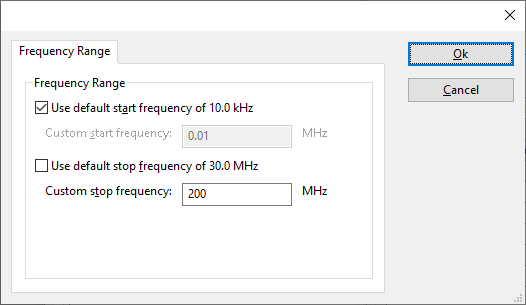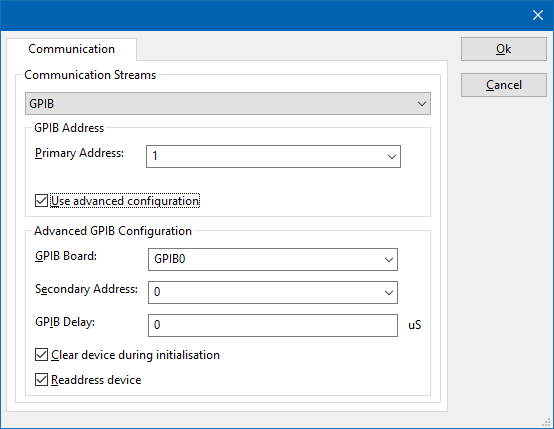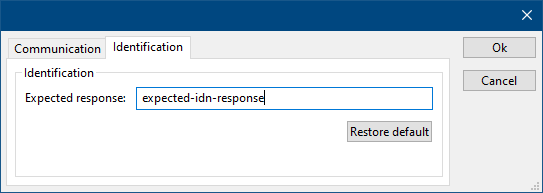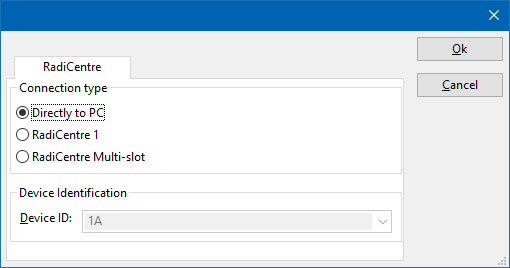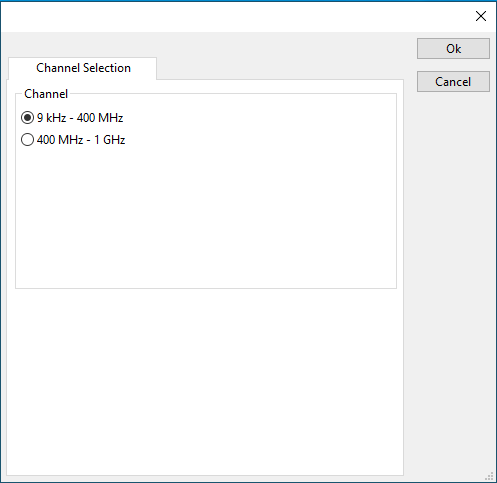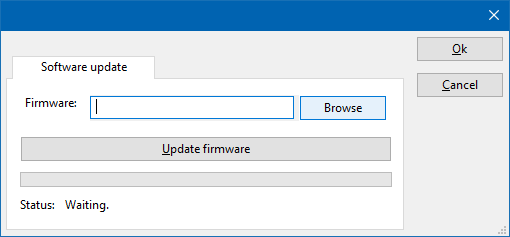DARE!! Instruments RPA0925A-150: Difference between revisions
DevicesBot (talk | contribs) (Updated DeviceDriverInfo template) |
DevicesBot (talk | contribs) (Updated DeviceDriverInfo template) |
||
| (145 intermediate revisions by 2 users not shown) | |||
| Line 1: | Line 1: | ||
{{DeviceDriverInfo | {{DeviceDriverInfo | ||
|DLLFile=RADAMP.DLL | |DLLFile=RADAMP.DLL;RADCOUP.DLL | ||
|DeviceBrand=DARE!! Instruments | |DeviceBrand=DARE!! Instruments | ||
|DeviceDriverName= | |DeviceDriverName=RPA0925A_150_COUP | ||
|DeviceType=RPA0925A-150 | |DeviceType=RPA0925A-150 | ||
|SupportedDeviceTypes= | |HideAutoData=1 | ||
|SupportedDeviceTypes=6 | |||
}} | }} | ||
{{:RadiAmplifierDeviceDriverConfiguration}} | |||
Latest revision as of 01:03, 17 May 2024
The DARE!! Instruments RPA0925A-150 device driver is a Amplifier, Coupler which is supported by RadiMation®.
Configuration[edit]
The following tabs are available in the advanced configuration of the DARE!! Instruments RPA0925A-150:
The frequency range of the DARE!! Instruments RPA0925A-150 as provided by the manufacturer is shown and selected as default. It is possible to overrule these frequencies and to manual adjust the allowed frequency range of the DARE!! Instruments RPA0925A-150.
| If the checkbox is checked, the default start frequency will be used as the lowest usable frequency in a test for this device. |
| If the Use default start frequency checkbox is unchecked, another start frequency (expressed in MHz) can be specified. The customized start frequency will then be used as the lowest usable frequency in a test for this device. The customized frequency can be a limitation or an extension of the default start frequency. |
| If the checkbox is checked, the default stop frequency will be used as the highest usable frequency in a test for this device. |
| If the Use default stop frequency checkbox is unchecked, another stop frequency (expressed in MHz) can be specified. The customized stop frequency will then be used as the highest usable frequency in a test for this device. The customized frequency can be a limitation or an extension of the default stop frequency. |
Specifying a different frequency range can be useful if for example:
- A device (like a coupler, antenna, injection device, cable, etc...) is still useable (but out of specification) outside the standard suggested frequency range.
- An external mixer is used to measure an extended frequency range.
- An up- or down-convertor is used to shift the frequency range.
- A newer model of a device is present that has an extended frequency range, and still uses the same remote control commands.
Be careful changing these setting as RadiMation® is no longer able to verify if the DARE!! Instruments RPA0925A-150 is used outside frequency range that is specified by the manufacturer. This may result to serious damage of your measurement device.
Configuration[edit]
The following tabs are available in the advanced configuration of the DARE!! Instruments RPA0925A-150:
The frequency range of the DARE!! Instruments RPA0925A-150 as provided by the manufacturer is shown and selected as default. It is possible to overrule these frequencies and to manual adjust the allowed frequency range of the DARE!! Instruments RPA0925A-150.
| If the checkbox is checked, the default start frequency will be used as the lowest usable frequency in a test for this device. |
| If the Use default start frequency checkbox is unchecked, another start frequency (expressed in MHz) can be specified. The customized start frequency will then be used as the lowest usable frequency in a test for this device. The customized frequency can be a limitation or an extension of the default start frequency. |
| If the checkbox is checked, the default stop frequency will be used as the highest usable frequency in a test for this device. |
| If the Use default stop frequency checkbox is unchecked, another stop frequency (expressed in MHz) can be specified. The customized stop frequency will then be used as the highest usable frequency in a test for this device. The customized frequency can be a limitation or an extension of the default stop frequency. |
Specifying a different frequency range can be useful if for example:
- A device (like a coupler, antenna, injection device, cable, etc...) is still useable (but out of specification) outside the standard suggested frequency range.
- An external mixer is used to measure an extended frequency range.
- An up- or down-convertor is used to shift the frequency range.
- A newer model of a device is present that has an extended frequency range, and still uses the same remote control commands.
Be careful changing these setting as RadiMation® is no longer able to verify if the DARE!! Instruments RPA0925A-150 is used outside frequency range that is specified by the manufacturer. This may result to serious damage of your measurement device.
Configuration[edit]
The following tabs are available in the advanced configuration of the DARE!! Instruments RPA0925A-150:
On the Communication tab, the desired communication method can be selected and configured. Depending on the selected method, additional relevant settings are shown and can be configured.
| Selects the medium or method that should be used to communicate with the device. Depending on the capabilities of the device this can be one or more of:
See the Communication Settings in Chapter 15, on how to configure each of these methods. |
On the Identification tab, the expected *IDN? response of the test and measurement device can be configured. It is used to determine if the correct test and measurement device is connected.
| The expected *IDN? response of a device. It can be changed in the case the commands are the same for another device for which no RadiMation® driver is available yet. |
| Restores the original Exepected response. |
There are several methods in which the DARE!! Instruments RPA0925A-150 can be connected to the PC. The DARE!! Instruments RPA0925A-150 can for example be connected directly to the PC, or through a plugincard in a RadiCentre 1 or a multi-slot RadiCentre. More information on how to use the RadiCentre is present in the product manual of the RadiCentre. The settings on the RadiCentre tab can be used to specify how the DARE!! Instruments RPA0925A-150 is connected.
When the DARE!! Instruments RPA0925A-150 is connected to a multi-slot RadiCentre, also the slot number in which the plugincard is fitted, should be specified.
| Specifies that the DARE!! Instruments RPA0925A-150 is connected directly to the PC, without the use of a RadiCentre. |
| Specifies that the DARE!! Instruments RPA0925A-150 is connected to a plugincard that is fitted in a RadiCentre 1. |
| Specifies that the DARE!! Instruments RPA0925A-150 is connected to a plugincard that is fitted in a multi-slot RadiCentre that also can be manually controlled using the display on the front of the RadiCentre. The slot number in which the plugin card is mounted can also be selected. |
| Specifies that the DARE!! Instruments RPA0925A-150 is connected to a plugincard that is fitted in a multi-slot RadiCentre Ultra. This RadiCentre Ultra has no display, and can only be used when remote controlled. |
The settings on this RadiCentre tab, only specifies if and which RadiCentre is used. The communication settings on the Communication tab specify the connection settings to communication with the measurement device.
The configuration on the Communication tab should be configured depending on the outgoing connection from the PC. Thus if Directly to PC is selected, the communication settings should be configured as what is actually used between the PC and the DARE!! Instruments RPA0925A-150 itself. If RadiCentre 1, RadiCentre multi-slot or RadiCentre multi-slot Ultra is selected, the communication settings should be configured as what is actually used between the PC and the RadiCentre. In the configuration where a RadiPower is connected with USB to a multi-slot RadiCentre, which is connected by GPIB to the PC, the communication settings of the RadiPower device driver should thus be GPIB.
If the DARE!! Instruments RPA0925A-150 is for example connected to slot 3 of a multi-slot RadiCentre which has IP address 192.168.178.95 and is connected by LAN to the PC, the following settings should be configured in the device driver of the DARE!! Instruments RPA0925A-150:
- RadiCentre tab
- Connection type: RadiCentre multi-slot, using as slot number: 3
- Communication tab
- Communication Stream: VISA
- LAN: 192.168.178.95
The output channel of amplifiers supporting multiple output channels can be configured
| Select the channel to be used by the DARE!! Instruments RPA0925A-150. |
The Software update tab can be used to update the software of the DARE!! Instruments RPA0925A-150.
| Specifies the filename of the software update file that should be used to update the software of the measurement device. |
| Allows to select the software update file. |
| Starts the actual software update. First some checks are performed, and if those checks are successful, the actual software update is performed. |
| Shows a message during the software update, indicating the performed action and the actual status. |
| Warning: | The software update can take a few minutes. During the actual software update the window is disabled, and cannot be closed. It is possible that Microsoft Windows shows messages that the RadiMation® software is not responding. Ignore those messages and do not kill, abort or end the software. Also do not disconnect the connection between the DARE!! Instruments RPA0925A-150 and the PC, while the software update is being performed. |
After the software update is completed, a messagebox will be shown that the software update has been completed succesfully. In the case that an error has occured, this will also be shown. In case that an error has been detected, it is strongly suggested to directly use the RadiMation® Error Report function to report the error to Raditeq.
